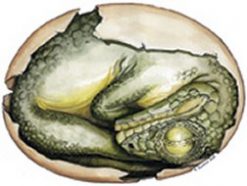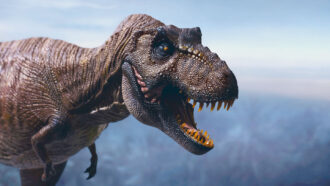Dino Babies
Fossilized eggs suggest that baby dinosaurs may have relied on grown-ups for help.
By Emily Sohn
Some dinosaurs needed babysitters, too
Scientists have recently analyzed the oldest dinosaur eggs ever discovered with embryos still inside. The study suggests that the dinos couldn’t take care of themselves when they first hatched, say the researchers, who come from the University of Toronto at Mississauga in Ontario. Just like human babies, the little dinosaurs relied on grown-ups for help.
The study closely examined two of seven eggs that were discovered 30 years ago in South Africa. The 190-million-year-old eggs belonged to a common plant-eating dinosaur called Massospondylus carinatus, the researchers say. Fully grown, the creatures measured about 5 meters (over 16 feet) long.
 |
|
Skeletal features of a fossil of a dinosaur just before hatching reveal ungainly proportions and little evidence of teeth. |
| Illustration by K. Dupuis/University of Toronto, Mississauga |
Six of the eggs held bones and other remains that filled their shells. That fact, plus the highly developed state of the bones, suggests that the baby dinos were nearly ready to hatch.
As big as the two embryos were, all of them had empty tooth sockets except one, which only had a single tooth. That means that M. carinatus babies were probably born without teeth or with teeth that were soft and so not preserved as fossils. The scientists say that the youngest of these dinosaurs wouldn’t have been able to bite leaves off of trees. Adults would have had to feed them.
Grown-up M. carinatus walked on two legs. However, the shape of the embryo skeletons made the researchers conclude that the babies traveled on all fours. They had large heads, thick necks, and small pelvic bones, so they would have been awkward and in need of guidance from older, bigger relatives.
Funny enough, dinosaurs that lived later on were built like M. carinatus babies even as adults and grew up to be huge, weighing up to 100 tons and stretching up to 40 meters long. It’s possible that these ancient embryos were an early sign of what was yet to come.—E. Sohn
Going Deeper:
Perkins, Sid. 2005. Young and helpless: Fossils suggest that dinosaur parents cared. Science News 168(July 30):68. Available at http://www.sciencenews.org/articles/20050730/fob3.asp .







